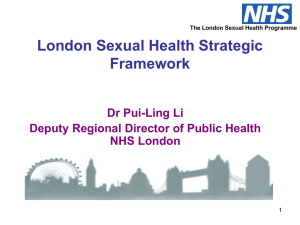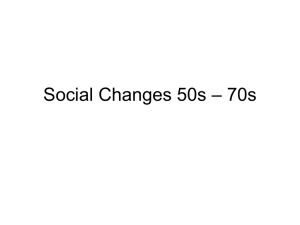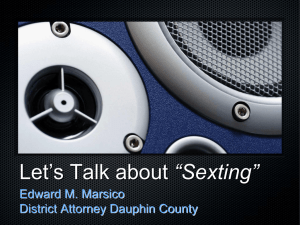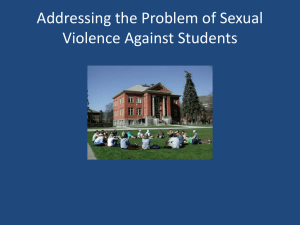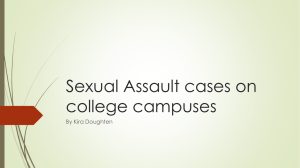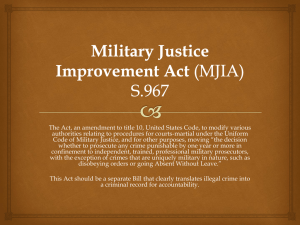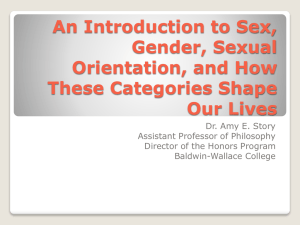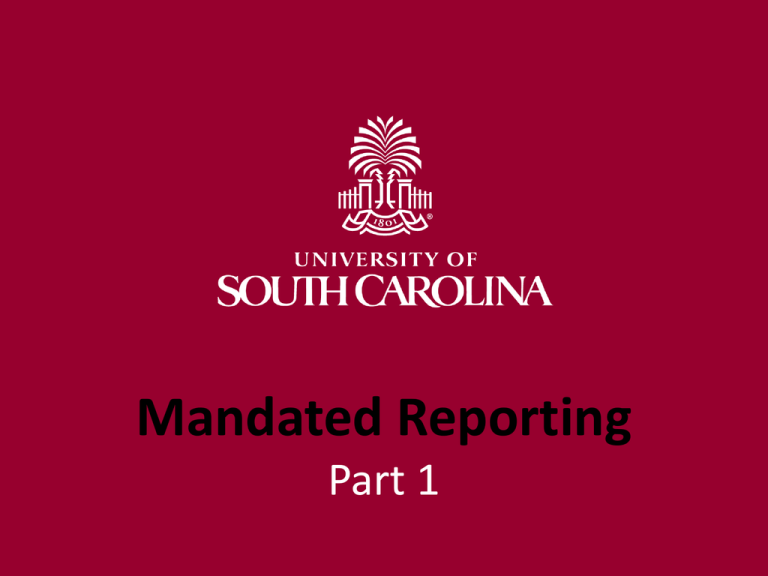
Mandated Reporting
Part 1
Mandated Reports
• Everyone in SC is allowed to report, but
mandatory reporters can be charged if they fail
to report
• People who are not mandatory reporters cannot
be charged
Who Are Mandatory Reporters in SC?
•
•
•
•
•
•
•
•
•
•
•
•
•
•
•
•
Doctors
Nurses
Dentists
Optometrists
EMT’s
Mental Health
Allied Health
Counselors
Principals
Assistant Principals
Computer Technicians
Clergy
Teachers
Judges
Police/Law Enforcement
Film Processors
• Substance Abuse Treatment Staff
• Childcare Workers
• Social Workers/Public Assistance
Workers
• Undertakers
• Funeral Directors (and staff)
• Coroner (and staff)
• Medical Examiner (and staff)
• Juvenile Justice Workers (2010)
• Foster Parents (2010)
• Guardian ad Litems (2010)
• School Truancy/Attendance
Officers (2010)
When to Report
• Reason to believe:
– child’s physical or mental health or welfare
– has been or may be adversely affected
– by abuse or neglect
• And this information is received in your
professional capacity
Privileged Information
Only 2 groups can claim privileged
communication
1. Attorney – Client
2. Clergy – Penitent
What is Reason to Believe?
• Information must be such that a reasonable
person would rely upon it, including hearsay
• Does not require the reporter to have conclusive
proof
• Does not require proof beyond a reasonable
doubt
Who is a Child?
• For abuse and neglect a person is considered a
child until their 18th birthday
• DSS should be contacted if the perpetrator is a
parent, guardian or other person responsible for
the child’s welfare
• Law Enforcement should be contacted if the
perpetrator is any other individual
Other Person Responsible for
Child’s Welfare
• Foster parent
• An operator, employee, or caregiver, of a public
or private residential home, institution, agency,
or childcare facility
• An adult who has assumed the role or
responsibility of a parent or guardian for the
child, but who does not necessarily have legal
custody of the child
Other Person Responsible for a
Child’s Welfare Does Not Include:
• A person whose only role is as a caregiver and
whose contact is only incidental with a child, e.g.,
as a babysitter or a person who has only
incidental contact but may not be a caretaker, has
not assumed the role or responsibility of a parent
or guardian
Making A Report
• Telephone or in person
• Local DSS office or Local Law Enforcement Office
– Child’s name
– Age and date of birth
– Address
– Present location
– Names and ages of siblings
– Parent’s names and addresses
– Reasons for concerns
Making A Report
• As soon as possible
• Do not assume the role of DSS investigator/ or
law enforcement
• Do not wait for proof
• Providing name is preferred
• Follow organizational procedures
• You are individually required to report
• Law reads must make a report
Confidentiality
• DSS and law enforcement must keep the identity
of the reporter confidential
• May share the name of the reporter with each
other to further their investigations
• Reporter may also be required to testify
Immunity from Liability
S.C. Code Ann. § 63-7-390
• A person required or permitted to report who
participates in an investigation or judicial
proceedings resulting from the report, acting in
good faith, is immune from civil and criminal
liability
Failure to Report
S.C. Code Ann. § 63-7-410
• A person who is required to report child abuse
and neglect and who fails to do so is guilty of a
misdemeanor and, upon conviction, must be
fined not more than $500 or imprisoned not
more than six months or both
Title IX
• A recipient of Federal funds is required to
adopt and publish grievance procedures for
prompt resolution of complaints of sexual
harassment.
• U.S.C. has such a policy from informal
mediation to a formal investigation, hearing
and an appeal in more egregious cases.
If You Experience Sexual
Harassment
• Immediately report it and DO NOT IGNORE it
• Let the individual know you object to the
behavior
• Keep a record of each instance with dates,
times, places, witnesses, etc.
• A faculty/staff member receiving such a report
should consult with Office of Equal Opportunity
Programs.
Concerns of Retaliation
• Title IX requires the school take steps to not only
prevent further harassment but to prevent
retaliation against the reporting student.
• U.S.C. has a policy stating that any retaliation
against the person making the complaint, any
witnesses to the complaint or the filing of the
complaint is strictly forbidden.
• If you suffer retaliation, report this matter to the
Office of Equal Opportunity Programs.
Other Issues to Address in Policy
• Policy must allow for a confidentiality standard
in the investigation for the student filing the
complaint
• Administrators should explain retaliation policy
to complaining student and that a request for
confidentiality may limit the school’s ability to
respond
• Regardless, school must take reasonable steps
to prevent harassment of other students
Behaviors Considered Sexual
Harassment
• Unwelcome sexual advances
• Requests for sexual favors
• Language, graphic material, or physical conduct
commonly understood to be of a sexual nature
• Demeaning sexist remarks
• Other verbal or physical conduct of a sexual
nature
Those Behaviors Are Especially
Offensive When:
• It is implied or clearly stated that submission to
or rejection of the behavior will affect or is a
term or condition of, the individual’s employment
or educational status, or
• They create a coercive, hostile or intimidating
atmosphere, or interfere with an individual’s
academic or work performance.
U.S.C.’s Policy in Accordance with Title IX
• You can find our policy in the U.S.C. Policies and
Procedures manual, EOP 1.02.
• A copy of this policy can also be obtained by
calling the Office of Equal Opportunity Programs
• http://www.sc.edu/policies/eop102.html
Reporting Sexual Assaults
• The Sexual Assault and Violence Intervention &
Prevention (SAVIP) is located on the 1st floor of the
Thomson Student Health Center (803)777-8248
• What is a sexual assault? Sexual battery in S.C. is
defined in S.C. Code Section § 16-3-651 also U.S.C.
Definition:
– Non-consensual touching of intimate parts; penetration and/or
force
– Forcing an unwilling person to touch another’s intimate parts;
– Can also be penetration while victim is incapacitated
If Sexual Assault Reported, What
Next:
• Student Health Services has a protocol in place
for the sexual assault survivor.
• Immediate staff response:
• Victim should be escorted to Women’s care by a
nurse from the nurse’s station IF report is b/w
Mon – Fri;
• SAVIP staff should always be notified
• There is an on-call schedule for non-regular
hours responses
SAVIP – If assault happened w/in 120
hours
•
•
•
•
Extremely important to empathize with victim
Victim should not be left alone
Believe the victim/survivor
Let the victim/survivor be in control of the
situation and he or she should make the decision
whether or not to pursue reports to police, going
through with the rape protocol exam, etc.
• More than 72 hours passed, typically no DNA
Protocol Response
• Call SAVIP (803) 777-8248 during regular hours
• Any other time use the on-call roster posted in both the
GMC or WCC to contact advocate
• The SAVIP advocate is the one who will:
– Explain the options of reporting to law enforcement
– Encourage the victim to go to the hospital
– Offer to stay with the victim
– Encourage victim to seek counseling
– File an advocate report with SAVIP
Your Responsibility As A USC
Official
• If you have knowledge about an assault you are
required to file an anonymous report with the
Director of Sexual Assault & Violence Intervention
& Prevention in addition to supporting the victim
and referring that person to campus resources.
Jeane Cleary Act
• Federal act that requires an educational institution
receiving federal funds to disclose crime statistics
for the campus
• Even anonymous reports of sexual assault are
counted
• Campus includes:
– Fraternity and Sorority Life housing
– Remote classrooms
– Unobstructed public areas adjacent to or running
through the campus
Mandated Reporting
Part 2
Children on a College Campus?
• Academic Programs
• Student
Affairs/Recreation
• Health Services
• Admissions
• Human Resources
• Special
Events/Advancement
• Conference Services
• Institutional
Counsel/Office of Legal
Services
Gallagher Higher Education Practice, 2012
Academic Programs
•
•
•
•
•
•
•
Music lessons
Prodigy Students
Under 18 freshmen
High school/Bridge programs
Internships
Summer academic enrichment for youth
Research Subjects
Gallagher Higher Education Practice, 2012
Student Affairs/Recreation
•
•
•
•
•
Pools
Sporting Fields and Tracks
Summer Camps
Under-Aged recruits
Local community service projects organized by
students
– Fraternity and Sorority events
Gallagher Higher Education Practice, 2012
Health Services
• Health Care recipients
– Summer camp attendees receiving medical care
– Speech and hearing screenings
• Counseling Services
Gallagher Higher Education Practice, 2012
Admissions/Human Resources
•
•
•
•
•
Prospective Students
Job shadowing programs
“Bring your child to work” day
“Bring your family” picnics/parties
Community building events
Gallagher Higher Education Practice, 2012
Special Events/Advancement
•
•
•
•
•
•
•
Trick-or-treating
Homecoming
Graduation
Class reunions
Younger siblings staying in residence halls for visits
School children visit campus for field trips
Rental of facilities for conferences and sports
camps
Gallagher Higher Education Practice, 2012
Types of Child Abuse
and Neglect
•
•
•
•
Physical or mental injury
Excessive corporal punishment
Sexual offenses
Neglect (Failure to supply food, clothing, shelter,
supervision, education, medical care)
• Abandonment
• Encouraging delinquency
• Substantial risk of abuse or neglect
Sexual Abuse
• Commits or allows to be committed against the
child a sexual offense defined by the laws of
South Carolina
• Engages in acts or omissions that present a
substantial risk of sexual offense as defined in
the laws of South Carolina
Sexual Battery
•
•
•
•
•
Sexual Intercourse
Cunnilingus
Fellatio
Anal Intercourse
Any intrusion, however slight, of any part of a
person's body or of any object into the genital or
anal openings of another person's body
• Exception: medical treatment or diagnostic
purposes.
No Physical Evidence in Most Cases
As many as 85-90% of children who give a history
of sexual abuse have a NORMAL or nonspecific
physical exam.
WHY?
Minimal facts interview
• Interview may be the most important aspect of
investigation
• This type of interview can be conducted by any
mandated reporter or first responder
• Basic who, what, and where
• NO DETAILS!!
Reasons for a Minimal Facts Interview
• Frequently, mandated reporters and first
responders are not trained in forensic interviews
• The location/situation is not suitable for a
trained interviewer to conduct a full forensic
interview
• Interviews are the main element of the
investigation that is attacked by defense
attorneys (1 wrong question can taint the case)
• The child’s statement is often the only evidence
Jessie’s Law
• S.C. Code § 17-23-175 Provides for an investigative
interview of a child to be admitted into evidence
and is considered an exception to the hearsay rule.
• Passed in 2006 in response to need for child
victims to have a stronger voice in the courtroom.
• Typically, no physical evidence of abuse, no video,
no medical findings…only the word of a child.
Provisions Of Child Hearsay Law
• Applies to children under 12
• For sex offender registry offenses only
• Statement made in response to investigative
interview
• Video and audio recording preferred
• Child must still testify at trial
S.C. CODE Sections §16-3-655 et.al.
• Criminal Sexual Conduct w/ Minor First Degree
• Criminal Sexual Conduct w/ Minor Second
Degree
• Criminal Sexual Conduct w/Minor Third Degree
• All of the above offenses require lifetime Sex
Offender Registry, DNA database, and Central
Registry of Abuse with DSS
S.C. Age of Consent
• In S.C. you are able to consent to sexual activity
at the age of 16
• There is a “Romeo” clause which is detailed in
S.C. Code Section § 16-3-655(C)
– If a person is 18 years old or less and engages in
consensual sexual activity with a minor 14 years of
age or more, then there can be no prosecution of
this activity under the law.
S.C. Code Sections Involving Immoral
Sexual Activity w/Minors
•
•
•
•
•
First Degree Sexual Exploitation of a Minor § 16-15-395
Second Degree Sexual Exploitation of a Minor § 16-15-405
Third Degree Sexual Exploitation of a Minor § 16-15-410
Remember a minor is anyone under the age of 18
Focus of these laws is to protect children from being used
as sexual objects by adults in recordings, film, pictures, any
visual image showing sexual activity of a minor or
intending to incite sexual gratification
What is Sexual Activity?
• S.C. Code § 16-15-375
• Sexual intercourse, masturbation (even
simulated);
• touching, in an act of apparent sexual
stimulation or sexual abuse, of the clothed or
unclothed genitals, pubic area, or buttocks of
another person or the clothed or unclothed
breasts of a human female;
• Inserting any object into the genital openings
What is Sexually Explicit Nudity?
• S.C. Code § 16-15-375
• (a) uncovered, or less than opaquely covered
human genitals, pubic area, or buttocks, or the
nipple or any portion of the areola of the human
female breast; or
• (b) covered human male genitals in a discernibly
turgid state.
WHY DOES THIS MATTER?
• Criminal prosecution
• Collateral consequences: sex offender registry
for life; active electronic monitoring; residence
restriction; internet use restriction
Sexual Exploitation Third Degree §
16-15-410
• Under S.C. law you are guilty for just possessing
the photo…even if you were not the one who
took it.
• So, a 17 year old student sends you a picture of
her exposed breasts and she is wearing nothing
else but a low cut pair of panties. You keep the
picture and never distribute it.
• Violates S.C. law. You are now a felon and
registered sex offender for life.
Some Legal Issues
• Do current child exploitation statutes
adequately address youth’s use of social media?
• Do current state disturbing schools and bullying
statutes adequately address youth’s use of social
media?
Why Is This More And More Relevant
Today?
• Cyber Bullying – Rutgers Student Suicide
• Sexting – Sending sexually suggestive photos
and/or messages by cellular phone
• There are no laws in S.C. specifically penalizing the
above actions
• What have law enforcement and prosecutors had
to do?
Use The Laws Available To Them:
• Federal and SC child exploitation (pornography)
statutes prohibit specified visual depictions of
persons under 18
• S.C. Second Degree Child Exploitation:
•
•
•
Records, photographs, films, develops, duplicates, or creates
digital electronic file material that contains a visual
representation of a minor engaged in sexual activity
Distributes, transports, exhibits, receives, sells, purchases,
exchanges, solicits material . . . .
Felony carries 2-10 years, Requires lifetime SOR,
DNA database
Other Options in S.C. Law
• SC Code § 16-17-490 (Contributing to the Delinquency
of a minor) (0-3 years, SOR discretionary)
• SC Code § 16-15-250 (Communicating obscene
messages to other persons without consent) (0-3 years)
• SC Code § 16-15-325. Participation in preparation of
obscene material prohibited (0-1 year & $1000.00)
• SC Code § 16-17-420 Disturbing Schools
• Prohibits any person from willfully or unnecessarily:
• Interfering with or disturbing in any way or in any place
students or teachers of any school or college Acting in an
obnoxious manner on any school or college in SC
What Is Illegal Under Current Laws?
• Taking a sexually explicit picture of a person under
the age of 18.
• What is sexually explicit? “the showing of (a)
uncovered, or less than opaquely covered human
genitals, pubic area, or buttocks, or the nipple or
any portion of the areola of the human female
breast; or (b) covered human male genitals in a
discernibly turgid state”
S.C. Is Considering a Sexting Statute
• The General Assembly is working on a “sexting”
statute. Follow S.C. Legislature on-line:
Bill H 3130
• But, this Bill will not address it for students over 18
• What is commonly understood as “sexting” is
arguably addressed by federal and SC statutes and
application of those laws to youth using social
media raises issues of fairness and justice in this age
of changing technology
IN CONCLUSION
• Be aware of the technology around you;
• Keep a keen eye on how some use it to harass or
belittle a student and address it immediately
• Report it as a form of sexual harassment under
Title IX
• There are extreme consequences if the signs are
ignored
• Allow law enforcement to seize and review the
pictures/evidence. You are not exempted from
prosecution if you download or possess it
Children’s Law Center
1600 Hampton Street
Suite 502
Columbia, SC 29208
(803) 777-1646
http://childlaw.sc.edu

